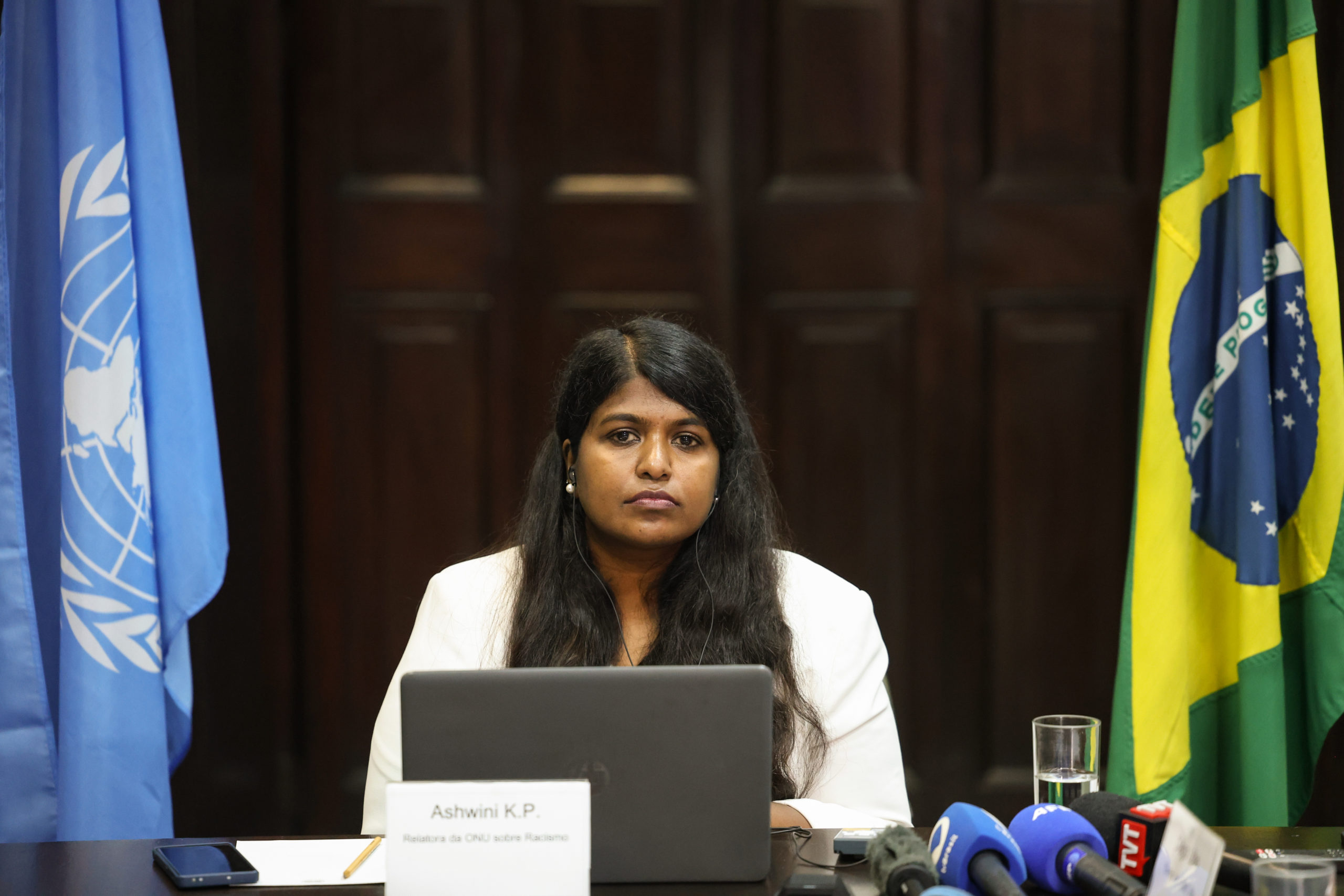UN expert warns about restrictions on legal abortion, the timeframe thesis and facial recognition in Brazil
During her visit to the country, the UN Special Rapporteur on contemporary forms of racism, Ashwini K.P, stressed that these issues are directly related to racial inequality in Brazil. She called for bold and transformative actions to address systemic racism
 Rio de Janeiro (RJ), 16/08/2024 – A Relatora Especial das Nações Unidas sobre formas contemporâneas de racismo, discriminação racial, xenofobia e intolerância correlata, Ashwini K.P. durante coletiva de imprensa no Palácio do Itamaraty, no centro do Rio de Janeiro. Foto: Tomaz Silva/Agência Brasil
Rio de Janeiro (RJ), 16/08/2024 – A Relatora Especial das Nações Unidas sobre formas contemporâneas de racismo, discriminação racial, xenofobia e intolerância correlata, Ashwini K.P. durante coletiva de imprensa no Palácio do Itamaraty, no centro do Rio de Janeiro. Foto: Tomaz Silva/Agência Brasil
After a 12-day visit to Brazil, the UN Special Rapporteur on contemporary forms of racism, Ashwini K.P presented a report outlining a number of concerns related to human rights and ethnic-racial discrimination in the country. Among the most critical points were the attacks on legal abortion and the timeframe thesis for the demarcation of Indigenous lands. The United Nations expert also called for the advancement of the use of body cameras by police and expressed concern about the racist nature of facial recognition services.
Ashwini K.P visited Brasília (DF), Salvador (BA), São Luís (MA), São Paulo (SP), Florianópolis (SC) and Rio de Janeiro (RJ) from August 5 to 16. She met with state and federal government representatives, communities facing racial discrimination, as well as more than 120 representatives of civil society.
Restrictions on legal abortion
The restricted access to legal abortion in Brazil, especially for women from marginalized racial and ethnic groups, was one of the issues addressed by the Rapporteur. She emphasized that, although abortion is permitted in specific cases such as rape, fetal anencephaly and when the woman´s life is at risk, many women still face significant barriers to accessing these services. A case in the state of Santa Catarina, where an 11-year-old girl came under pressure to not terminate a pregnancy resulting from rape, was cited as an example of the difficulties faced. Ashwini K.P called on Brazil to decriminalize abortion in all circumstances and ensure safe and legal access to abortion and post-abortion services, emphasizing the need to guarantee women’s bodily autonomy.
Read more
The Timeframe Thesis and territorial rights
The Rapporteur also expressed serious concern about the application of the Timeframe Thesis, which limits the recognition of Indigenous lands to those that were under the possession of Indigenous peoples on the date of the promulgation of the 1988 Constitution. According to Ashwini K.P the Thesis ignores the long history of violence and displacement suffered by Indigenous peoples, like the Xokleng in Santa Catarina and poses a threat to territorial rights. She highlighted that, despite some recent progress in land demarcation, the current pace is insufficient, leading to a continued scenario of violence against Indigenous and Quilombola communities.
Use of body cameras and artificial intelligence
Regarding public security, the expert addressed the use of body cameras and facial recognition systems by police forces in Brazil. She praised the Ministry of Justice’s initiative to promote the use of body cameras but pointed out that their implementation is still ineffective in many states. Additionally, she expressed concern about the growing use of facial recognition systems, which, in her opinion, can exacerbate racial profiling and violence against Afro-descendants and other marginalized groups. Ashwini K.P called for strict regulation based on human rights principles for the use of these technologies, aiming to protect the rights of the communities that are affected.
Urgent actions
“The seriousness of the situation demands the utmost urgency. Bold and transformative actions to dismantle systemic racism cannot wait.” Said the Rapporteur. According to her assessment, the pace of change does not match the urgency of the situation faced by marginalized racial and ethnic groups in Brazil. She pointed to significant gaps in the implementation and scope of laws and policies and stated that progress on key issues of racial justice has been slow. “People from marginalized racial and ethnic groups have already waited too long for justice and equality.” She said. “There are lives that depend on bolder and more immediate actions.”
According to the Rapporteur, systemic racism has persisted since the formation of the Brazilian state, despite the continuous and courageous advocacy efforts of marginalized ethnic and racial groups. The UN expert commended Brazil for recognizing racial discrimination as a systemic issue and for seeking to adopt robust policies and laws to prevent it.
“Despite these efforts, the lives of Afro-descendants, Indigenous peoples, Quilombolas and Romani are often, and in many cases irreparably, marked by endemic racialized violence and exclusion.” Said the expert.
“This takes many forms, including the incessant violations of Indigenous and Quilombola peoples’ rights to land and territory, profound social, economic, cultural and political exclusion, environmental racism, mass incarceration under inhumane conditions and racialized police brutality.” Concluded Ashwini K.P.






